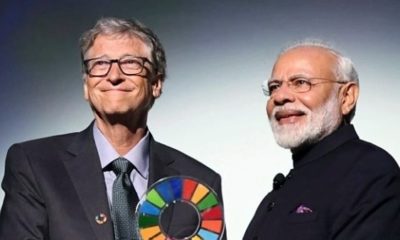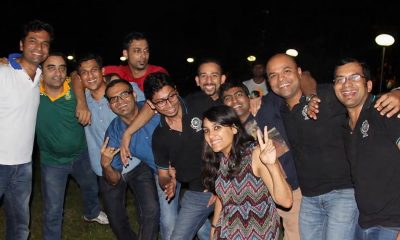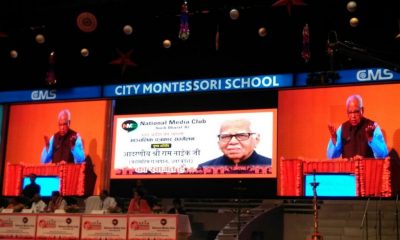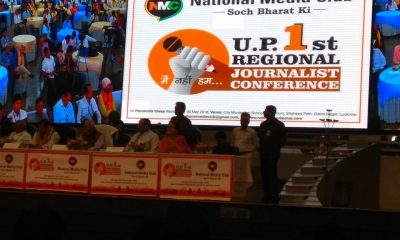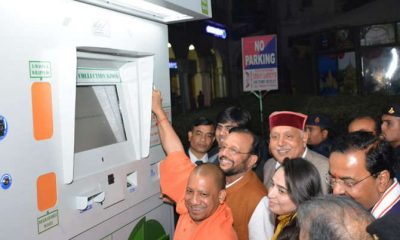National
Stage set to rank 75 top cities under ‘Swachh Bharat’

New Delhi: The stage is set to recognise cities that have taken “Swachh Bharat” campaign seriously, with a Top 75 ranking based on feedback from 20 million citizens, among others parameters, says the chair of the institution that has conducted the exercise.
Which is the cleanest Indian city? Who are the leaders? Who are the slow movers? Answers to these questions — “Swachh Survekshan” — would be unveiled on Monday by Urban Development Minister M. Venkaiah Naidu, based on an exercise conducted by the Quality Council of India.
“It has been 16 months now since the Swachh Bharat Abhiyan was launched. It is now time to take stock. Swachh Survekshan will help us assess the level of cleanliness and awareness in 75 cities,” council chairman Adil Zainulbhai told media.
But isn’t it too early to assess a project like this, particularly given the state of cleanliness in India? “On the contrary, we want to make the campaign even more successful. We want to foster a spirit of healthy competition between cities,” he said.
“In fact, we have already started moving towards our next task — even more challenging. It is to make Swachh Survekshan a quarterly affair and go on to rank as many as 4,000 cities an towns in the country,” added Zainulbhai, former India chief for McKinsey.
The Swachh Bharat campaign was launched by Prime Minister Narendra Modi on October 2, 2014 — Mahatma Gandhi’s birthday — calling upon the citizens to realise the dream of a clean India by the 150th birth anniversary of the Father of the Nation in 2019.
The council chairman said Swachh Survekshan involved citizen feedback, a self-evaluation by municipalities and an independent assessment by experts. All these were based on a uniform cleanliness index so as to make it totally non-discretionary and scientific.
The exercise also involved six measurable aspects of sanitation and hygiene:
– How cities proposed to stop open defecation and integrate solid waste management systems
– Communication strategies on information, education and behaviour change
– Systems adopted for for sweeping, door-to-door collection and transportation of waste
– Efficiency in processing and disposal of waste
– Deployment of public and community toilets
– Progress in construction of individual household toilets.
Zainulbhai said 110 assessors, most of them engineers, visited over 50 locations in each city to make an assessment across several parameters. The locations included bus stands, railway stations, planned and unplanned colonies, community toilets, religious places and market areas.
A base-year pre-survey was also conducted in 476 cities before the launch of this exercise. The results were then tallied with the latest findings in each of the 75 designated cities for their ranking, he said, adding the results will also be shared on the MyGov website.
National
Foodman Vishal Singh Honored for Hunger Free World Mission in Bangkok

Lucknow: Vishal Singh, a renowned social worker from Lucknow, also known as Foodman, has once again made India proud. He was honored by the Happy Hands Gloves Cooperative Limited Company in Korathai, Thailand, for his work with the Hunger Free World Mission.
The Hunger Free World Mission’s meeting was held in Korathai, Thailand, under Vishal Singh’s leadership. Representatives from several countries, including Mr. Raja Dwivedi (Managing Director of Happy Hands Gloves Limited), Thailand Coordinator Mr. Raja Mishra, and member Mr. Varun Singh, attended the event.

Under Vishal Singh’s leadership, the attendees took a pledge to work together toward creating a hunger-free world.
Speaking on the occasion, Vishal Singh explained that the main goal of the Hunger Free World Mission is social participation. He said the mission is not just about feeding people but also about meeting other basic needs of those who are struggling. The mission focuses on helping families of terminally ill patients in hospitals by providing food and shelter. It also works to fulfill essential needs like education, jobs, and care for the elderly.
For the last 16 years, the Vijay Sri Foundation has been providing free services, benefiting thousands of people. Vishal Singh highlighted that the mission aims to gain global recognition like other organizations such as WHO, WWF, and Red Cross, which work for social causes.
During this meeting, Vishal Singh was appointed as the Chairman of the Hunger Free World Mission by representatives from various countries. They also discussed holding regular meetings in different countries to push the mission forward.
Business tycoon Dr. Abhishek Verma has also supported this humanitarian mission, vowing to promote the idea of “Seva Parmo Dharma” (Service is the highest duty) worldwide. Vishal Singh praised him, stating that people like Dr .Abhishek Verma inspire others to work for the betterment of society.
Recently, Romania’s Ambassador, Mr . Daniela Sezonov Ţane, invited Vishal Singh to the Romanian Embassy in Delhi, where they discussed the mission in detail. Impressed by his humanitarian work, she honored Vishal Singh and invited him to Romania to take the mission forward .
Food man Vishal Singh has been serving the people of India for the past 16 years. Through the Vijay Sri Foundation, he provides free meals to cancer patients & their families ,shelter, and education for women & children along with running free old-age homes in Lucknow.
In addition to his humanitarian work, Vishal Singh also addresses issues like crime and corruption through his role as Chairman of Seva Path Media and Managing Director of Vijay Sri Foundation.

During the COVID-19 pandemic, Vishal Singh and his team worked tirelessly to provide food and help to the needy, including starving children, elderly citizens, and pregnant women. Despite contracting the virus himself, he continued to assist others after his recovery. He even created a life-saving oxygen regulator using household items, which was praised by doctors both in India and abroad.
In his address at the meeting, Vishal Singh spoke about his mission to create a hunger-free world. He pointed out that India’s large population, along with issues like unemployment and poverty, has caused the country to fall on the Hunger Index. He urged people to contribute just one handful of grains daily to help create a hunger-free world.
He concluded by saying that through social participation, we can empower the people around us, meet their basic needs, and work together to build a stronger, more prosperous, and developed society.



